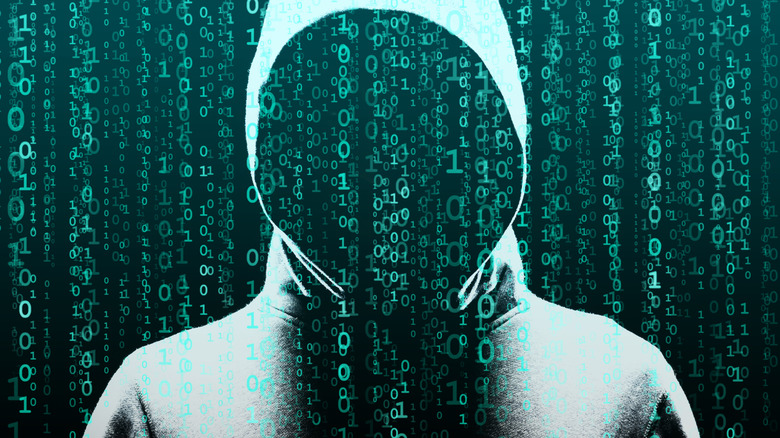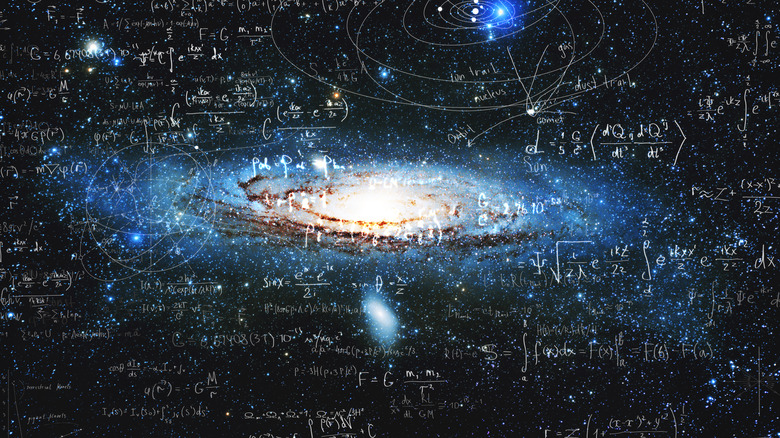Signs We May Be Living In A Simulation
You open your eyes to another beautiful morning. Outside your window is a bright blue sky with wispy clouds. With a cup of coffee in hand, you take a minute to appreciate this wallpaper-worthy sight, before you shift your gaze downward. As you watch people scurrying about like busy ants six stories below, something flickers out of the corner of your eye. You snap your head to the direction of the disturbance but see nothing on the street that could have caused it. Come to think of it, that brief flash didn't really seem like sudden movement. In fact, it seemed more like a momentary glitch in reality. But what if that's what it actually was?
Strap yourself in, because it's big brain time.
The simulation hypothesis: the reality behind our reality
Chances are, you're no stranger to the idea that the world people live in isn't real. (If you're familiar with a little movie from 1999 called "The Matrix," then this concept definitely isn't new to you.) The newest take on this idea — and the one that tends to get the most media mileage these days — is the version that Oxford philosopher Nick Bostrom popularized in his 2003 paper.
Bostrom laid out three scenarios — that none of the universe's intelligent or human-like civilizations survive long enough to learn how to create and run simulations of reality; these civilizations do reach that point but opt not to create or run said simulations, for whatever reason; and there are civilizations capable of this, meaning there are potentially more simulations of reality than non-simulations ... and that the world is most likely inside one (via BBC).
As computer scientist Rizwan Virk, author of the book, "The Simulation Hypothesis," explained in an interview with Vox, "You can think of it like a high resolution or high-fidelity video game in which we are all characters."
Posthuman simulations: blasts from the past
In his paper, Nick Bostrom suggested that the reality that is being experienced might just be part of what he called a "posthuman simulator." According to Bostrom, a posthuman civilization would have acquired "most of the technological capabilities that one can currently show to be consistent with physical laws and with material and energy constraints." Such a civilization would have already attained the technical know-how to establish a system of incredibly powerful computers running an extremely detailed scenario replicating reality.
It's entirely possible that none of us are living, breathing, flesh-and-blood humans. Rather, humans are all simulated beings, our minds taken from people who are long gone. As Bostrom said in an interview with NBC News, even though there is no current technology to simulate brains, that doesn't necessarily mean that it's impossible. Oh, and there could actually be many of these "ancestor-simulations" running at the same time.
Take a minute to think about how much power these posthuman simulators would actually need. Following the video game analogy that Rizwan Virk shared with Vox, such a simulation would have to account for every single element within our immediate surroundings — whether they're leaves blown by the wind, trash on the ground, or even a sudden ray of sunshine — at every single moment, even before they are noticed, just to keep us immersed in the simulation (via Built In).
Identifying the intelligent designer
When Nick Bostrom presented the idea of ancestor-simulations in his paper, he noted that it would likely be the descendants of biological humans running them.
Bostrom wrote that his third scenario — there are capable civilizations, so there are potentially more simulations of reality than non-simulations — can only be true if the first and second aren't. After all, the first scenario involves an intelligent civilization getting wiped out before it could develop and harness the level of technology needed to run this reality. Meanwhile, the second scenario – civilization does not reach extinction but also opts not to create or run simulations – would only be true if all the elites of civilization could agree to never run simulations of reality (which is unlikely, given how dangerous the combination of wealth and curiosity — or boredom — can be). He also speculated that unless the third scenario is true, it is highly unlikely that our descendants would have the ability or desire to run simulated realities.
An article on Built In speculates that it could be a member of an advanced species in the driver's seat, possibly using quantum computing — or perhaps a level of technology that is currently beyond our comprehension — to run a simulated reality.
But why would there even be a simulation?
Does the concept of an omnipotent, omniscient simulation creator sound familiar? That's because religions all over the world embrace the idea of an ultimate architect, a supreme being that created and designed the world. NASA scientist Rich Terrile frames this as a "recast idea" of the concept of a single creator. Except here, there is a considerably greater focus on science and mathematics and less focus on faith (via NBC News).
Regarding the reasons why anyone would run such a simulation in the first place... well, why not? After all, people are currently using simulations to gather data, study the possible outcomes of specific courses of action, and develop models that can help us make better decisions. Or, as astrophysicist and Nobel laureate George Smoot put it, simulations help improve what is known about our planet, enabling us to improve it and even save lives (via BBC).
Then again, if this actually were a simulation, then that would imply that human beings are at the top of the list of things in the universe worth simulating — a notion that's questionable, at least for Harvard physicist Lisa Randall. As she told NBC News, "I don't know why this higher species would want to bother with us."
Weird physics: The way to the truth?
Whenever a movie or TV show wants to set the stage for some science fiction shenanigans to go down, odds are you'll hear the word "quantum," typically as a prefix. As it turns out, the secret to figuring out if humanity is really in a simulation might lie in this popular physics concept.
"Quantum" comes from the Latin word for amount or "how great," says ThoughCo. In physics, it refers to the smallest amount of a physical quantity that can exist as a distinct and separate unit. Kind of like computer pixels on your screen, right? In an article published by BBC, George Smoot observed that quantum physics' quirks are reminiscent of a simulation. For instance, tiny things are considerably challenging to observe and study, kind of how the images on your computer screen become pixelated the further you zoom in. It's a simple (albeit crude) analogy, but it seems like a good starting point in our quest to meet our puppeteers (if they are out there).
Meanwhile, nuclear physicist Zohreh Davoudi suggests that examining cosmic rays (mysterious, high-energy atom fragments zooming through space at close to lightspeed) might yield answers as well. Simply put, if reality were truly made up of pixels, these rays would look quite peculiar up close (via Space.com).
Could all of reality be just some fancy math?
In his interview with Vox, Rizwan Virk mentioned the idea of "computational irreducibility." Essentially there are certain systems in which you can't skip steps or speed up the process. To fully understand how they happened, you'd have to work your way through each step of the computation by, say, simulating it. Virk believes this may be a major hint that nature and reality may not exactly be what people think they are.
Meanwhile, physicist James Gates observed that subatomic particles seem to behave according to rules that seem a little too much like a computer's error-correcting codes (via Space.com). Gates found it strange that such rules would exist in a universe that isn't founded on computations. "Error-correcting codes are what make browsers work, so why were they in the equations that I was studying about quarks, and leptons, and supersymmetry?"
In a separate article on Space.com, astronomer Martin Rees emphasized that it all boils down to whether computers powerful enough to simulate the universe could exist. At the very least, he believes that at some point in humanity's future, computers could have enough processing power to simulate "a fairly large fraction of a world."
A multiverse of (simulated) madness
It's possible that this universe will never see a civilization with computers powerful enough to create a convincing simulation of reality. The operative word there, of course, is "this."
Physicist Paul Davies described a scenario in which a universal computing machine would spawn a simulated world capable of spawning another simulation inside it, which is also capable of spawning another one, sort of like a matryoshka doll of simulations (via The Guardian). In such a vast playground, argued Davies in an interview on Space.com, it's conceivable to find at least a few universes with intelligent civilizations capable of such simulations. If this were the case, it's easy to see how there could be an infinite number of simulations — multiverses full of simulated worlds outnumbering real ones.
However, this is also why the multiverse argument doesn't really help us get closer to an answer to "Are we in a simulation?" As Davies explained, the multiverse can theoretically exist only because of our universe's laws of physics — which means that if humanity is living in a simulated universe, that also means humans are abiding by simulated ("fake") physics. Which in turn leads us to a circular argument that takes us nowhere nearer to the truth. Or, as Davies put it, "Science is then reduced to a charade, because the simulators of our world — whoever or whatever they are — can create any pseudo-laws they please, and keep changing them." (Need some Tylenol yet?)
Science fiction has tackled this, many times
For most people, "The Matrix" is probably the first movie that comes to mind when they hear about simulated realities. In the film, the life of an otherwise unremarkable computer programmer changes forever when, upon ingesting a red pill, he realizes that he and billions of others have been living in a simulation all along (via Vox). However, this sci-fi hit is far from the only work of science fiction to tackle the concept. Heck, it's not even the first one. An article on BBC mentions "Videodrome" (from 1983, directed by David Cronenberg) and "Brazil" (from 1985, helmed by Terry Gillam) as noteworthy examples of films involving the horrors of simulated realities.
Likewise, there is no shortage of science fiction novels dealing with the same subject. A 2016 article from The New Yorker shines the spotlight on Greg Egan's 1994 novel "Permutation City," in which a computer programmer creates a second, digitized version of himself existing in a simulated reality while he lives in the real one. Other works that explore the idea of alternate reality or simulated worlds include Philip K. Dick's "Eye in the Sky," Douglas Adams' "The Hitchhiker's Guide to the Galaxy," and Ray Bradbury's short story, "The Veldt."
...And so have philosophers, for thousands of years
Throughout history, some of the world's most notable thinkers have laid out their own questions and ideas about why reality may not exactly be what it seems.
According to Built In, a significant number of people regard the simulation hypothesis as a "modern offshoot" of Plato's "The Republic" — or more specifically, the well-known "Allegory of the Cave." In a nutshell, the scholar's allegory features cave prisoners drawing conclusions about reality from the shadows of puppets they can't actually see. Basically, a prisoner who sees the shadow cast by a book may think and draw assumptions from that shadow about what a book really is but can only learn the truth if he breaks free and sees the actual book with his own eyes (via Syfy Wire). Another example is from 1641, when philosopher René Descartes presented the idea of an evil demon powerful enough to create an illusion that looks and feels like reality.
Meanwhile, BBC told the story of how writer Samuel Johnson responded to philosopher George Berkeley's idea of the world essentially being immaterial — a kick to a large stone and the words "I refute it thus."
What today's thinkers think
BBC noted that many of today's vocal simulation theory proponents are self-professed science fiction aficionados. One of the most prominent people entertaining the simulation hypothesis is billionaire techpreneur Elon Musk. He not only said that the odds of us living in "base reality" are infinitesimal but also claimed that the rate of videogaming's development places the eventual creation of unmistakably real simulations within the realm of possibility (via The New Yorker).
Interestingly enough, 2016's annual Isaac Asimov Debate at the American Museum of Natural History hosted a discussion in which five brilliant minds — Zohreh Davoudi, James Gates, and Lisa Randall, alongside cosmologist Max Tegmark and philosopher David Chalmers — tackled the subject of cosmic simulation. Randall in particular expressed confusion about just how enthusiastic many people are when it comes to this topic, adding that if ever, the revelation that this was all a simulation should not affect our curiosity and methodology for studying the world by a single bit (via Built In).
Can we actually prove we're in a simulation?
Here's the tricky part. Experts say that for the most part, it would be extremely challenging, if not downright impossible, for us to see for ourselves that humanity is living in a simulation. And that's because, well, if this were a simulation, then that would mean people are in it and will only experience whatever reality and rules our unseen creators have decided to implement within the boundaries of our "universe."
As computational mathematician Houman Owhadi shared with Scientific American, a simulation with limitless computing power would be able to anticipate and swiftly create exactly the kind of reality humanity is expecting to see (like how a video game would preemptively load certain objects within a player's line of sight to keep the player immersed in the gaming experience). Space.com shared the way David Chalmers established this point succinctly during the 2016 debate — "There's certainly not going to be conclusive experimental proof that we're not in a simulation. Any evidence we could ever get would be simulated!" Then again, if you start noticing floating computer error dialog boxes in mid-air, then that would be a tell-tale sign — or "knock-down proof," as Nick Bostrum called it in an NBC article, that this was all merely a simulation.
Oh, and according to philosophy professor Preston Greene, the simulators (if this were indeed a simulation) would most likely pull the plug on us once they realize that the jig is up (via Built In).
If so... then, so what?
Let's assume, for the sake of argument, that Nick Bostrom, Rizwan Virk, and their simulation-hypothesizing ilk turn out to be right. What would happen to society in the face of such a mind-blowing revelation? According to Harvard astronomer Abraham Loeb, humanity could devolve into absolute mayhem and lawlessness, especially if the consequences of our actions would no longer matter. "There is nothing more damaging to our social order than this notion," he said in an article on NBC News.
But if this were the case, then why bother trying to find out? For Virk, it's a matter of pursuing the truth, which he says is a sign of good science. He also likened it to a video game, in the sense that fully knowing our environment enhances the likelihood of us succeeding at whatever is attempted to accomplish within our reality (via Built In).
Still, whether humanity is in a simulation or not, it doesn't change the fact that this reality is our reality — and that all anyone can really do is make the most out of it. Perhaps Max Tegmark summed it up best during the 2016 Isaac Asimov Debate, as published on Space.com – "If you're not sure, at the end of the night, whether you're actually simulated or not, my advice to you is to go out there and live really interesting lives, and do unexpected things, so the simulators don't get bored and shut you down."












